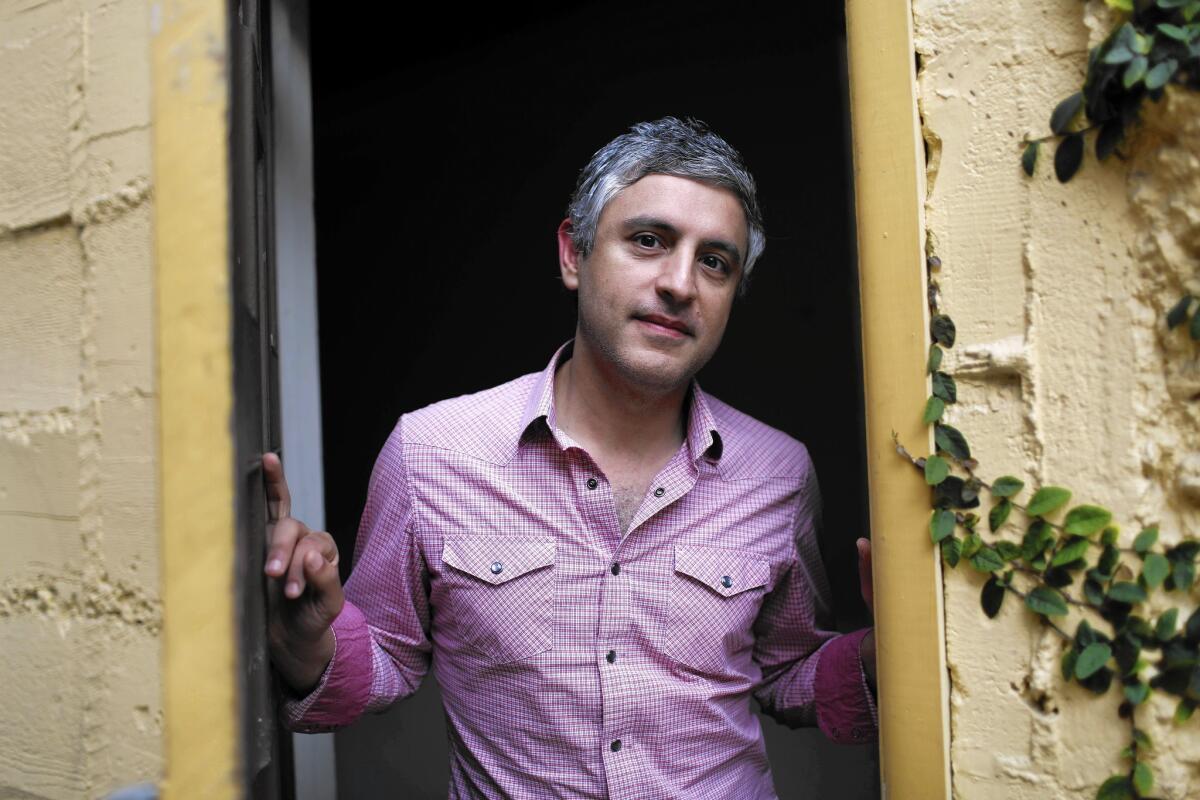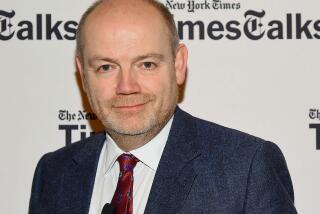In CNN’s ‘Believer,’ Reza Aslan to aim for a window on world religions

CNN is looking to a higher power in its quest to get new viewers.
The cable news network’s original series lineup for 2016 includes “Believer,” featuring religious studies scholar Reza Aslan, who will delve into different religious practices around the world. Think of it as “Anthony Bourdain: Parts Unknown” with faith instead of food as a window to explore cultures.
The six-episode series, based on an idea that Aslan has been pitching for a few years, will be another element in CNN’s strategy to get people to tune in when there isn’t breaking news.
“It’s an opportunity to show religious traditions, practices, rites and rituals that may at first seem weird and foreign and exotic and unfamiliar — because you’re unfamiliar with the metaphors underlying those ideas,” Aslan said in a telephone interview from his Hollywood office. “At the end of an hour episode, they will all of a sudden become much more familiar and recognizable.”
Religious programming has found an audience on television going back to when Bishop Fulton Sheen got big ratings just by dissecting inspirational topics on his chalkboard for the DuMont and ABC networks in the 1950s.
In recent weeks, CNN has been topping its cable news competition with “Finding Jesus: Faith, Fact, Forgery,” in which scientific and archaeological methods are used to examine physical evidence of Christ’s existence. The program has averaged 1.2 million viewers a week since its premiere.
Aslan, who wrote the controversial bestseller “Zealot: The Life and Times of Jesus of Nazareth,” will cast a wider net with his program, undoubtedly influenced by his own personal experience. A creative writing professor at UC Riverside who holds a PhD in sociology with a focus on religions, Aslan became a born-again Christian after coming to the U.S. from Iran. He later converted to Islam.
On “Believer,” Aslan could take viewers to Pakistan for the annual Shia mourning ceremony and flagellation exercises. Or he could go to Israel to observe members of Na Nach, an ultra-Orthodox Jewish movement that combines rave culture and all that involves (yes, alcohol and drugs) with spirituality to create, as he describes it, “something brand-new.”
The show is part of a broader effort by CNN President Jeff Zucker to expand the network beyond the 24/7 news cycle and into documentaries and other kinds of shows. Thanks to its original series’ performances, CNN’s prime-time audience was down 1% in 2014 compared with the previous year when it experienced double-digit declines. The channel still remains a distant second behind Fox News Channel.
Producing shows like “Believer” costs more than a live show with talking heads in the studio. But Zucker said the improved ratings from such series as “Parts Unknown,” “The Hunt With John Walsh” and “The Sixties” have made the approach profitable.
“We know that the original series have brought in viewers who do not watch CNN and that has helped us,” he said. “Some of those people have stayed for the news coverage.”
Religion experts are intrigued by the idea of Aslan’s upcoming program, which comes at a time when politics and faith have become intertwined in the national discussion about terrorism.
“Often, religious or ethnic identities are quickly conflated to ideological positions—whether it’s right-wing Christianity or militant Islam, which is just a small part of a complex ways in which religion interacts with society and with politics,” said Mark Juergensmeyer, director of the Orfalea Center for Global and International Studies at UC Santa Barbara. “To present the complexity of faith and the way in which people believe — which is what the CNN title implies — is perfect.”
Aslan often says he never wanted to be an academic “who spent his time in a dusty university basement poring over the vowel markings on some ancient Akkadian text.”
An interview with Fox News religion correspondent Lauren Green in July 2013 ruled out that possibility forever.
Green turned Aslan into a viral video star. She repeatedly asked the 42-year-old Aslan how, as a practicing Muslim, he could be objective in writing “Zealot,” which portrays Christ as a political rebel in 1st-century Palestine rather than a celestial being — a concept that irked some conservative critics.
Aslan calmly responded by explaining his academic background. But Green did not relent, questioning his legitimacy and accusing him of not disclosing his Muslim background in previous interviews. Viewers from all over the globe marveled at the way he kept his cool throughout the 10-minute interrogation on FoxNews.com.
“I started receiving emails from Bangladesh, from Cambodia — everywhere in the world — from people telling me they saw the interview,” Aslan recalled during the phone interview from Hollywood. “I heard from parents telling me that they sat down with their children to show them how to conduct yourself when you were in a situation where you’re being attacked.”
Turning the other cheek is a job requirement when your expertise is a hot-button issue for people around the world.
“I talk about religion and faith for a living,” he said. “And I am myself a person of faith. I’ve never been that kind of scholar, or thinker, who is interested in attacking or deflating other people’s faith.”
It’s been an upward trajectory for Aslan ever since his tangle with Green. The already successful “Zealot” surged to No. 1 on several bestseller lists and is now being made into a theatrical movie by Lionsgate.
Though Aslan is a believer, he will never try to tell you that there is a God.
“There is no proof for the existence, or the nonexistence, of God,” he said. “And anyone who tells you otherwise is trying to convert you. Faith is a choice. But it’s not an irrational choice. It is the result of one’s empirical experience of the world, and of reality, and one’s place in the world. You either believe that there is something beyond the material realm or you don’t. And you can’t be convinced, one way or the other.”
Aslan’s wife, Jessica Jackley, is a Christian. But the couple is teaching their two sons to be well-versed in all religions. “If religion is nothing more than a language, we want them to be multilingual,” he said. “When they are old enough and they want to pick a language to express their personal faith, they can pick whichever language they want to.”
Does that mean there could one day be a bar mitzvah in the Aslan household?
“I would be delighted if one of them wanted to have a bar mitzvah,” Aslan said. “How they choose to express their faith is completely up to them. My job is to familiarize them with their options, with the multiple ways in which they can, should they choose to, live a deep, spiritually committed life.”
Times staff writers Meg James and Yvonne Villarreal contributed to this report.
More to Read
The complete guide to home viewing
Get Screen Gab for everything about the TV shows and streaming movies everyone’s talking about.
You may occasionally receive promotional content from the Los Angeles Times.







